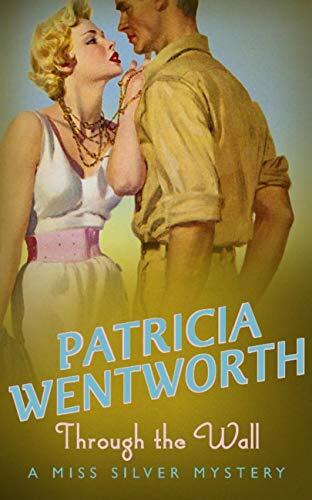Through The Wall

A review of Through The Wall by Patricia Wentworth – 230517
In the nineteenth of her Miss Silver series, which was originally published in 1950, Through the Wall, has created a shared house in which a dangerous cocktail of “hatred, jealousy, spite, wounded affection, and deep unhappiness” in the words of the amateur sleuth is allowed to brew with disastrous consequences. In a book which is as much a demure romantic novel as a murder mystery, the result is two murders, an attempted murder, a suicide, and an attempted suicide as the emotions generated by a strange will bubble to the surface. Fortunately, Miss Silver, with a combination of deductive sleuthing and a deep understanding of human nature as well as an uncanny ability through her innocent, dowdy image to worm her way into households and blend into the background, is on hand to solve the case.
Wentworth’s principal strength is her ability to tell a story and hold her reader’s attention and, boy, she is put to the test with this one. To say it is a slow burner is an understatement and it does not really pick up any sort of pace until the last third. In her defence she does have a lot of background to cover for the plot to make sense but, true to style, she must include some romantic interest, ignited in the unlikely setting of being trapped under a carriage after a train crash, and develop at least one weak and feeble female character, which makes the story meander and divert from the straight and narrow of the central storyline. It is overlong and could have benefited from a judicious pruning. Nevertheless, Wentworth’s narrative style does engage the reader and it is an easy, undemanding read.
The cause of the trouble is a will. Martin Brand, a wealthy man, has collected a motley crew of relatives and others who live in his house and at his expense, none of whom he likes nor is he inclined to leave his estate to any of them. After what can only be described as a piece of due diligence, he decides to give his money to a niece, Maria Brand, whom he has never formally met because of a family estrangement. Of course, Brand dies soon afterwards, of natural causes – note, if you want to live a long time, never make a will, an act that will be sure to accelerate your death either through natural or unnatural means – and Maria Brand inherits, much to the disgust of the resident relatives.
Being a soft-hearted old thing Maria is reluctant to evict the disappointed relatives and the house she inherits reverts to its old design where it is split into two with dividing doors bolted on one side and locked another, an arrangement that becomes key to the unravelling of the mystery. Her sentimentality persuades Maria to continue to accommodate her weak and sickly sister, Ida Felton, and her indolent husband, Cyril, who drinks and gambles what money he has and disappears intermittently in pursuit of success on the stage.
Add to the mix the outrage of Brand’s relatives at being cut from the will, a singer, Helen Adrian, staying at the house who is convinced she is being blackmailed by Cyril, a grasping Cyril who believes that Ida has been done out of what is rightfully hers, and a houseful of relatives who would gain materially if Maria died, and there is no surprise that there is murder most foul. However, it is not Maria who is murdered.
The local Inspector quickly identifies the culprit, but as usual has rushed to a hasty conclusion. As with The Brading Collection Miss Silver initially rejects a commission but an appeal from Richard Cunningham, Maria’s beau, brings her riding to the rescue and teams up with her charge from her days as a governess, Randall March, to sift through the clues which, sprinkled through the text, lead her to conclude that the acuity of hearing and mistaking one thing for another are the keys to unravelling the identity of the culprit who, having murdered once, has no compunction about murdering again to cover their tracks. There are subplots and red herrings galore to keep the reader on their toes, alibis, and movements to be checked, and while Wentworth does her best to divert the reader’s attention from the culprit, a bit of calm reflection makes their identity fairly obvious.
This is another book written after the euphoria of the victory has dissipated and the grim reality of post-war reconstruction has sunk in where there is a heavy whiff of nostalgia, a yearning for the good old days, a return to the status quo. In Wentworth’s hands it leads to murder but is perhaps reflective of a prevailing sentiment that the brave new world was not all that it was cracked up to be.



